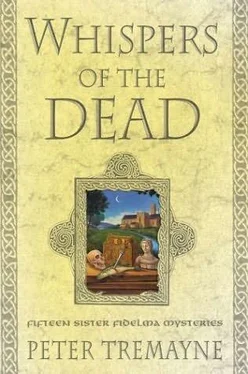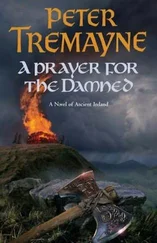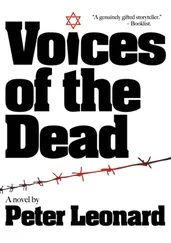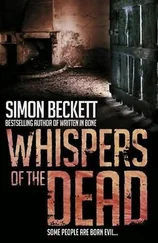Peter Tremayne - Whispers of the Dead
Здесь есть возможность читать онлайн «Peter Tremayne - Whispers of the Dead» весь текст электронной книги совершенно бесплатно (целиком полную версию без сокращений). В некоторых случаях можно слушать аудио, скачать через торрент в формате fb2 и присутствует краткое содержание. Жанр: Исторический детектив, на английском языке. Описание произведения, (предисловие) а так же отзывы посетителей доступны на портале библиотеки ЛибКат.
- Название:Whispers of the Dead
- Автор:
- Жанр:
- Год:неизвестен
- ISBN:нет данных
- Рейтинг книги:4 / 5. Голосов: 1
-
Избранное:Добавить в избранное
- Отзывы:
-
Ваша оценка:
- 80
- 1
- 2
- 3
- 4
- 5
Whispers of the Dead: краткое содержание, описание и аннотация
Предлагаем к чтению аннотацию, описание, краткое содержание или предисловие (зависит от того, что написал сам автор книги «Whispers of the Dead»). Если вы не нашли необходимую информацию о книге — напишите в комментариях, мы постараемся отыскать её.
Whispers of the Dead — читать онлайн бесплатно полную книгу (весь текст) целиком
Ниже представлен текст книги, разбитый по страницам. Система сохранения места последней прочитанной страницы, позволяет с удобством читать онлайн бесплатно книгу «Whispers of the Dead», без необходимости каждый раз заново искать на чём Вы остановились. Поставьте закладку, и сможете в любой момент перейти на страницу, на которой закончили чтение.
Интервал:
Закладка:
There were two types of fosterage, fosterage for affection and fosterage for payment. Kings sent their sons to other kings to be fostered. Had not Lugaid, son of the High King Conn Cétchathach of the Uí Néill, been sent to the Eóghanacht King of Muman, Ailill Olumm, to be raised and educated? From fosterage grew close ties between families. The relationship was regarded as something sacred and often the foster children became more attached to their foster parents than to members of their own family. Cases had occurred where a warrior had voluntarily laid down his own life to save that of his foster father or foster brother.
Fidelma had been told that in the year of her birth, at the great battle of Magh Roth, the High King, Domhnall mac Aedo had been concerned for the personal safety of his rebellious foster son, Congal Cáel, King of Ulaidh, against whom he was fighting. In spite of Congal’s attempt to oust his foster father from the kingship, both foster father and foster son regarded one another with affection, and when Congal was slain, Domhnall lamented as if he had lost the battle.
The law on fosterage was written down in minute detail.
For a while Fidelma thumbed through the text and then she suddenly realized the passage of time. She reached forward and picked up the small silver handbell and shook it. The door opened immediately to its summons and a thin-faced religieux with rounded shoulders scurried into the room to stand before her.
Brother Corbb had been Brehon Spélan’s clerk for many years. He did not look prepossessing but Fidelma knew that he understood his job thoroughly and was as well versed in law as many who had qualified.
“Has Brehon Spélan told you that he has asked me to hear this case of death by neglect in his absence?” she opened.
The thin-faced man inclined his head. It was a swift almost sparrow-like movement.
“He has, lady.” Brother Corbb preferred to ignore her religious office and address her as the sister to Colgú, King of Muman.
“I am told it concerns a death in fosterage. Who is the plaintiff?”
“Fécho is the father of the dead child. He is a smith.”
“And the defendant?”
“Colla, a wainwright, lady, a maker of wagons.”
“Are they both in attendance in the Hall of Hearings? And all who are witness to this matter also present?”
“They are. Shall I give you the details about them?”
Fidelma shook her head.
“I do not want to prejudge anything, Brother Corbb. I will hear from the witnesses themselves and make my own interpretations and judgments as we proceed.”
“Be it as you wish, lady.”
She rose from the desk and Brother Corbb moved to the door to hold it open for her to pass through. Then with nimble movements he contrived to close the door behind her and then move back into a position to lead her into the Hall of Hearings.
There were many people there, comprising of the two extended families involved-the families of both the plaintiff and those of the defendant. Young as well as old were included. As Brother Corbb led Fidelma into the hall and up to the raised platform on which she would sit as judge, a murmuring broke out which was quickly hushed by a movement from Brother Corbb, who banged a wooden staff on the floor to indicate the court was in session. Fidelma had put down the manuscript book and taken her seat. She examined the expectant upturned faces slowly before speaking.
“I am Fidelma of Cashel,” she announced.
“In the absence of Brehon Spélan it is I who will hear this case. Does anyone present object?”
There was a silence and she smiled dryly.
“Qui tacet consentit,” she intoned. Silence implies consent. “Let the plaintiff or the dálaigh for the plaintiff stand forward and state their case.”
A man with dark hair, short of stature but well muscled, with clothes that betrayed his calling-a leather jerkin and trousers-stood up hesitantly and coughed as if to clear his throat.
“We are poor folk in Críonchoill,” he began. “We can’t afford the ten séds that a lawyer would cost to represent us. I will speak for my family.”
Fidelma frowned.
“I presume that you are Fécho the smith?” On receiving a gesture of confirmation, she continued: “Before you commence, I would offer a word of advice. If you do not have funds to pay for legal representation, have you considered the possible outcome of legal action? If you cannot present a good case and I find it so then you have to pay the court fees, that is the aile déc, which is called the judge’s fee. And if your testimony is found false against him that you accuse, you may find yourself having to pay fines and compensation.”
Fécho compressed his lips and shuffled his feet as he stood before her.
“I have discussed the matter,” he waved his hand to encompass his entire family, “they have agreed that they will support me in this matter.”
“So long as you are aware of this fact,” Fidelma said. “I, myself, have to lodge five ounces of silver with this court to ensure that I carry out my duties as judge in an appropriate manner. If I do not, that is my loss. And if, on appeal, my decision is overturned because it is found in error, then I am fined one cumal -the value of three milch cows.”
She did not have to explain this but she saw the trusting and un-lettered people anxiously regarding her and felt that she had to make an effort to reassure them.
“Where is the defendant?”
The man who stood up was almost a replica of Fécho the smith, except his hair was a dirty, corn yellow. He, too, was tanned and muscular.
“I am Colla the wainwright,” he announced nervously.
“Understand, Colla, that what I have told Fécho also applies to you. If you are found guilty, you will have to pay the fines and the court costs. Do you understand?”
“I am not guilty and Fécho. .”
“You will have an opportunity to speak later,” she interrupted him sharply. “I am telling you the course of the law. I presume that you have no legal representation?”
“I do not.”
“Then having warned you of the consequence, I presume your fine, your kindred, are prepared to pay if the case goes against you?”
“But it will not. .” he began to protest.
A plump woman at his side tugged at his sleeve and said loudly: “The kindred are prepared to pay and will appeal if the judgment goes against us.”
“So long as you both understand. Colla the wainwright is classed, I see, as a chief expert wright, and his honor-price is adjudged in law as even greater than the highest grade of judge. Some twenty séds is the sum. Likewise, Fécho, the smith, is similarly classed as having an honor price of twenty séds. ”
“We know this,” interrupted Colla brusquely. “The equality of our honor prices is why we exchanged the contract for this fosterage.”
Fidelma sighed softly and indicated that the wainwright should be reseated. It was little use explaining to him the etiquette of court procedure.
“Let us hear your case, Fécho. Keep only to the facts as you know them and do not indulge in any story that you have heard or cannot prove.”
The blacksmith ran a hand nervously through his hair.
“My son was called Enda and he was seven years old. I claim he was murdered.”
“Murdered?” Fidelma was startled. “I thought that this was a case of death by neglect?”
“So I thought at first until Tassach. .”
Fidelma raised a hand to still him.
“Let’s us begin at the beginning. You may start by telling me how Enda came to be in fosterage with Colla.”
“As a wainwright Colla was well known to me for he often brought work to my forge. His workshop is on the far side of the hill from my forge. It occurred to me that Colla, who has several children and two apprentices whom he instructs in his art of wagon making, would be the ideal person to foster my son. One month ago we agreed on this course of action.”
Читать дальшеИнтервал:
Закладка:
Похожие книги на «Whispers of the Dead»
Представляем Вашему вниманию похожие книги на «Whispers of the Dead» списком для выбора. Мы отобрали схожую по названию и смыслу литературу в надежде предоставить читателям больше вариантов отыскать новые, интересные, ещё непрочитанные произведения.
Обсуждение, отзывы о книге «Whispers of the Dead» и просто собственные мнения читателей. Оставьте ваши комментарии, напишите, что Вы думаете о произведении, его смысле или главных героях. Укажите что конкретно понравилось, а что нет, и почему Вы так считаете.












